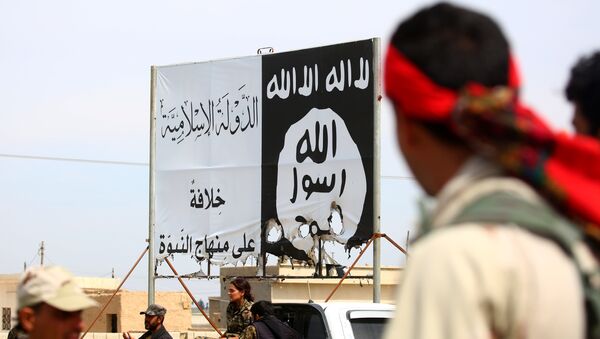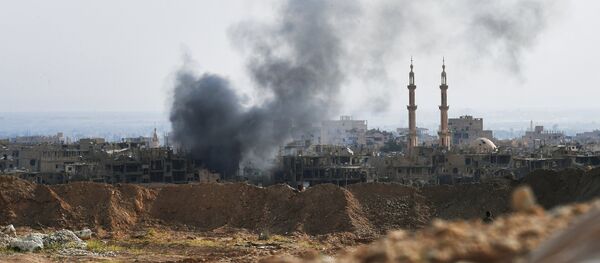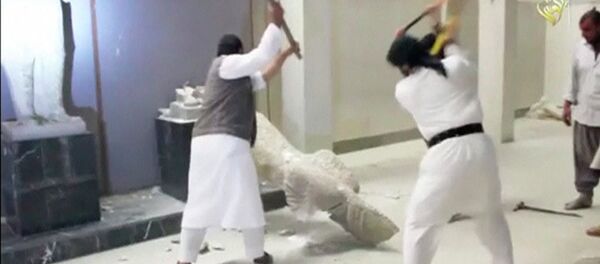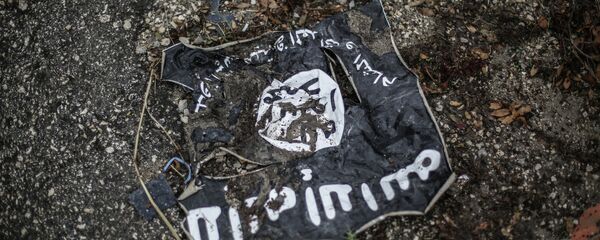Daesh is actively diversifying its financial sources and adopting new economic strategies, the deputy director of the Russian Foreign Ministry's Department on New Challenges and Threats, Dmitry Feoktistov, told journalists on Tuesday, bemoaning the fact that the Russia-drafted resolution seeking to impose a full embargo on Daesh has yet to be adopted.
According to Feoktistov, the terrorists have focused on at least three spheres: the restriction on the use of other currencies except gold, silver and copper coins minted by Daesh; a further reduction in the purchase price for antiquities from "diggers"; the attempts to maintain control over drug trade in Afghanistan and the search for new sources of income.
Daesh Gold Dinar Increases Value
It was reported in June 2015 that the self-proclaimed "caliphate" started minting its own gold coins worth $139 in an apparent attempt "to provide substantial support to their black-market oil-based economy" and evade dollar transactions, as Sputnik contributor Kristian Rouz explained.
One of the terrorist organization's mints had been operating in Turkey's southern province of Gaziantep until it was discovered and destroyed in October 2015.
However, after the beginning of Russia's air campaign in Syria, which inflicted considerable damage on Daesh-held oil infrastructure, the terrorists started accepting only US dollars for payments, as The Associated Press found out in February 2016.
Now, the terrorist organization has seemingly switched to its coinage again — this time to replenish its foreign currency reserves.
Daesh coins
— Rojava (@AzadiRojava) June 27, 2017
Soon useless everywhere ✌️ pic.twitter.com/ji6KxHMfYk
As Feoktistov revealed to journalists, terrorists have obliged civilians to change Syrian pounds and US dollars to dinars, which are sold at a price higher than gold in special "economic offices" run by Daesh.
The terrorist organization "declared its gold dinars, silver dirhams and copper fils the only legal currency in civil circulation on the territory of their pseudo-caliphate," he explained.
As a result, Daesh "has already sold 100,000 dinars at a price of over $180 apiece, according to some estimates, which brought the terrorists, about $18 million in revenue," Feoktistov said, suggesting that the money would be most likely spent on purchasing arms and ammunition.
Diggers Will Earn Less for Stolen Artifacts
Yet another novelty is Daesh's decision to reduce the price they pay to "black diggers," who provide the terrorist group with antiquities.
The terrorists smuggled antiquities through Lebanon while the city of Gaziantep in southern Turkey emerged as the largest trade center of objects of cultural heritage that were stolen by Daesh, as the former permanent representative of Russia to the UN, Vitaly Churkin, revealed in his letter to the Security Council in April 2016.
According to some estimates, Daesh's profit from the illegal trade of stolen artifacts reached $150-200 million a year.
As RT highlighted in November 2015, ancient Middle Eastern cultural artifacts looted by Daesh in Syria and Iraq were of high demand in Britain and other European countries and often ended up in public institutions, museums and in the hands of private collectors.
Earlier, in August 2015, the US Federal Bureau of Investigation (FBI) reported that cultural property originating from Syria and Iraq, and associated with the terrorist organization, had entered the US market.
Now that Daesh has lost many of its territories in Syria and Iraq, the terrorists are forcing diggers to cut prices for ancient works of art, thus seeking to increase their margin from selling the artifacts on the black market.
"If previously terrorists bought artifacts from black diggers at a price amounting to 20 percent of their estimated value, now they force diggers to sell their [archeological] finds with a 20 percent discount, in order to later sell them at higher prices," Feoktistov underscored, stressing that it clearly shows that Daesh still has a stable channel for the sale of artifacts, regardless of the sanctions imposed by the UN Security Council in 2015.
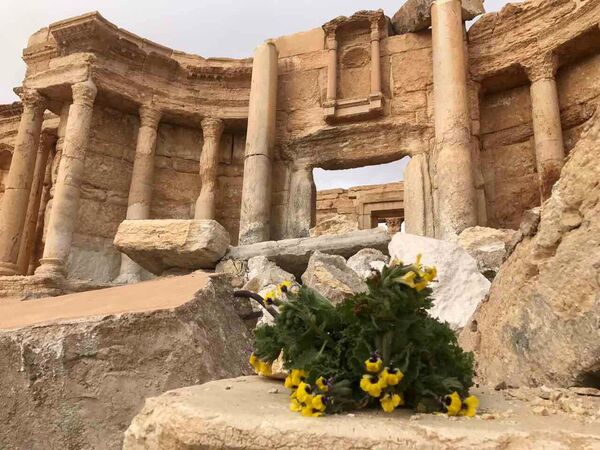
New Sources of Income: Drugs, Human Organs, Fast Payback Projects
Feoktistov pointed out that Daesh would continue to seek new sources of income, while trying to diversify existing ones.
The Russian diplomat called attention to the fact that the terrorist organization is currently trying to take control of the Afghan drug trade.
In June 2017, Feoktistov revealed that Russia has information about Daesh attempting to invest in projects in Western Europe via Middle Eastern banks. According to the diplomat, previously there were reports on Daesh's attempts to invest in real estate in New York City and Turkey.
Speaking to journalists on Tuesday, the diplomat surmised that Daesh wouldn't scruple to sell human organs to replenish its reserves, if necessary. Most likely the terrorists will jump at the opportunity to invest into fast payback projects, in particular: health care, pharmaceuticals, real estate, fish farms in Iraq or small car production, Feoktistov pointed out.
Russia has repeatedly sought to impose a full embargo on Daesh in order to asphyxiate the terrorist organization.
Unfortunately, the recent Moscow-led initiative, which sought to introduce a comprehensive trade and economic embargo against territories under Daesh control, was blocked by the US at the UN Security Council, Feoktistov said.
"Perhaps someone among those who is blocking our initiative is not interested in it," the Russian diplomat concluded.

